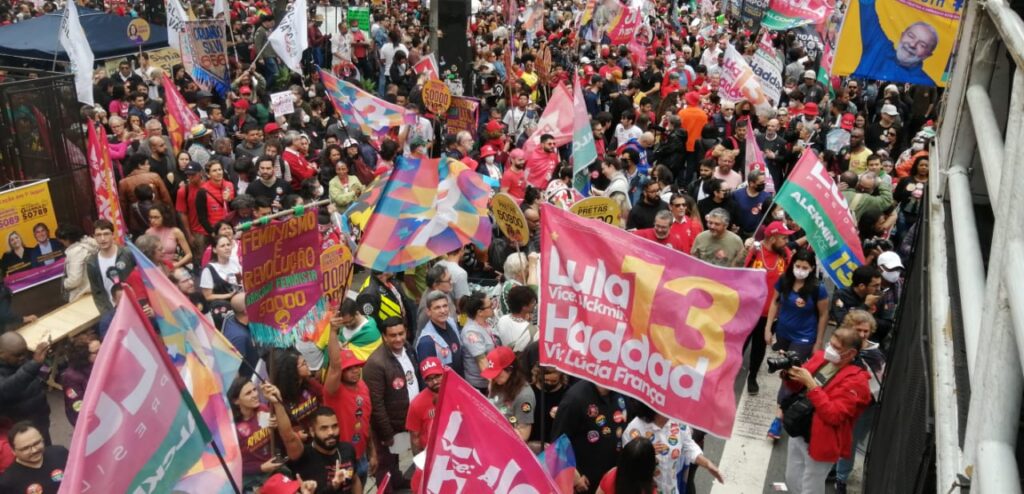
Today Brazil defines its next president, the polls opened at 8:00 a.m. Brasilia time, the country's capital, so that the 156 million 454 thousand 011 voters can finally elect the new president in this second round of federal elections , Luiz Inácio Lula da Silva ?Brazilian Coalition of Hope? or Jair Messias Bolsonaro ?Coalition for the Good of Brazil?.
Most of the pollsters put Lula at the forefront in the intention to vote for this second electoral day, in some taking up to four percentage points from the current president Jair Bolsonaro, who seeks re-election and continue to reside in the Alvorada Palace.
During the first electoral round, held on October 2, Lula da Silva won his rival in number of votes, however, he did not reach 50 percent plus one of the votes to stand as the winner in that contest and not go to a second round.
And it is that Lula, that Sunday took 57 million 259 thousand 504 votes, which meant 48.43 percent of all the votes, while Bolsonaro obtained 51 million 072 thousand 345 votes or 43.20 percent.
In recent weeks, supporters of both candidates have taken to the streets to support Lula or Bolsonaro, especially this Friday and Saturday before the final contest that will mark at least the next 4 years of government in Brazil.
But who is Luiz Inácio Lula da Silva?
Luiz Inácio Lula da Silva was born in 1945, in the semi-arid area of the state of Pernambuco, in northeastern Brazil, and was the seventh child of a farming couple. Without basic services such as electricity, water or bathrooms, his family moved to the south in search of better luck, to escape drought and poverty.
In São Paulo, Lula began to work as a child, after finishing elementary school he was employed in a metallurgical plant and was admitted to the technical course of mechanical lathe operator. In those years, São Paulo became the most industrialized area of the country, with some of the world's leading metallurgic factories.
Thus, da Silva was one of the many northeastern migrants who settled on the production line and made metallurgy their profession.
When the Workers' Party emerged, it was promptly supported and influenced by intellectuals, religious, artists, students and militants who had graduated from the armed struggle, and Lula was its first president. Thus, for two decades he was the workers' spokesman and main opposition leader, leaving his mark on the model of democracy installed in the country.
After three unsuccessful electoral campaigns, Lula was finally elected president of the Republic on November 27, 2002, and was the first worker to be installed as a tenant in the Alvorada Palace.
Re-elected for a second term, Lula chose his successor, Dilma Rousseff, and reached the end of the government with record popularity, as his administration was approved by 87% of the population in December 2010, according to Ibope.
Who is Jair Messias Bolsonaro?
Born in Campinas on March 21, 1955, Jair Messias Bolsonaro is a descendant of Italian immigrants who arrived in Brazil after World War II.
Son of Percy Geraldo Bolsonaro and Olinda Bonturi Bolsonaro, he was the third child in a family of three sons and three daughters, attended the Brazilian Army Preparatory School and graduated from the Agulhas Negras Military Academy in 1977.
He subsequently served in the army for 17 years and rose to the rank of captain. Bolsonaro gained notoriety in 1986, when he wrote an article for the popular magazine Veja, where he criticized the military's pay system.
His political career began in 1988, after leaving the army, when he ran for the Rio de Janeiro City Council and won a seat in the city's legislature. In 1990, two years after being elected, he won the first of seven consecutive terms as federal deputy for Rio de Janeiro.
Also known as the "Trump of the tropics," Bolsonaro won the support of the country's sizable evangelical Christian population with his staunch opposition to abortion and his defense of the traditional family, as well as public order policies that attracted Brazilians concerned about the crime and violence, and was elected President of the Republic in October 2018, with 55.13 percent of the Brazilian electorate, by the Coalition Brazil Above All, God Above All ?PSL/PRTB?.
In addition to defining their future president, in 12 states there will also be elections for governor and, in eight municipalities, voters will also elect new mayors.
The 12 states where the gubernatorial race will be defined this Sunday are Alagoas, Amazonas, Bahia, Espírito Santo, Mato Grosso do Sul, Paraíba, Pernambuco, Rio Grande do Sul, Rondônia, Santa Catarina, Sergipe and São Paulo.
This article was produced with the support of the organization Global Exchange in collaboration with Peninsula 360 Press.
You may be interested in: Everything boils in Brazil


